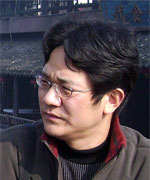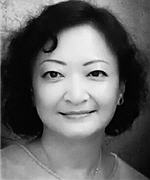|
|
 |
 |

胡弦
Hu Xian
 
胡弦,1966年生,现居南京,《扬子江诗刊》执行主编。出版诗集《阵雨》(2010)、《寻墨记》(2015)、《沙漏》(2016),散文集《菜蔬小语》(2008)、《永远无法返乡的人》(2016)等。曾获诗刊社“新世纪十佳青年诗人”称号(2009)、闻一多诗歌奖(2011 )、《作品》年度长诗金奖(2011)、徐志摩诗歌奖(2012)、《十月》年度诗歌奖(2012)、《诗刊》年度诗歌奖(2014)、中国诗歌排行榜2014-2015年度奖(2015)、花地文学榜年度诗人(2017)、鲁迅文学奖(2018)等。
Hu, Xian, born in 1966 and live in Nanjing, executive editor-in-chief of Yangtze River Poetry. He has published the following books of poetry: Rain (2010), Ink (2015), Hourglass (2016); as well as the complete work of prose Words of Vegetables. He was awarded “Ten Best Young Poets of the New Century” (2009), The Wen Yiduo Poetry Award (2011), The Xu Zhimo Poetry Award (2012), The October Literature Magazine Annual Poetry Award (2012), Poetry Magazine Poetry Award (2014), China Poetry Ranking 2014-2015 Annual Poetry Award (2015), Flower Garden Annual Poetry Award Poet of the Year (2017), and more.
|

|

译者
Translator
谢炯
Joan Xie
  谢炯, 诗名炯, 出生在上海。八十年代就读于上海交通大学管理系,1988年留学美国,取得企业管理硕士和法律博士学位。出版诗集《半世纪的旅途》(2015),散文集《蓦然回首》(2016),中文诗集《幸福是,突然找回这样一些东西》(2018),英文翻译诗集《十三片叶子》(2018)。2017年荣获首届德清莫干山国际诗歌节银奖。中文诗作发表在国内《诗刊》《扬子江诗刊》等文学诗刊。英文诗作和翻译作品发表在美国《诗天空》《唇》,《文学交流》等文学诗刊。 谢炯, 诗名炯, 出生在上海。八十年代就读于上海交通大学管理系,1988年留学美国,取得企业管理硕士和法律博士学位。出版诗集《半世纪的旅途》(2015),散文集《蓦然回首》(2016),中文诗集《幸福是,突然找回这样一些东西》(2018),英文翻译诗集《十三片叶子》(2018)。2017年荣获首届德清莫干山国际诗歌节银奖。中文诗作发表在国内《诗刊》《扬子江诗刊》等文学诗刊。英文诗作和翻译作品发表在美国《诗天空》《唇》,《文学交流》等文学诗刊。
Joan Xie was born in Shanghai where she attended Shanghai Jiaotong University. She came to the United States in 1988 to study business and law. Xie's Chinese poetry and essay collections include Half-Century Journey (2015), Looking Back (2016), Nothing Made Me Happier than Finding These Objects (2018) and she is the editor of Thirteen Leaves (2018). In 2017, she received a Silver award at First Moganshan International Poetry Festival in China. Her poems in Chinese appeared in well-known poetry magazines in China, such as Poetry Journal and The Yangtze River Poetry Journal. Her translations appeared in Exchanges Literature Journal, LIPS and Poetry Sky.
|
 |
花事 |
 |
Flowering |
江水像一个苦行者。
而梅树上,一根湿润的枝条,
钟情于你臂弯勾划的阴影。
灰色山峦是更早的时辰。
花朵醒来。石兽的脖子仿佛
变长了,
伸进春天,索要水。
|
|
River, an ascetic.
And a wet plum twig
spooned by your arm-shaped shadow.
Earlier the day, greyer the mountain.
Flowers wake up, and stone beast stretches its neck
longer, into
the spring, begging for water.
|
 |
左手 |
 |
Left-Hand |
右手有力。
左手有年久失修的安宁。
总是右手相握,在我们中间
打一个死结;或者
像个有力的扳道工。当生活
这列火车从右侧呼啸而过。左手,
在左侧有了另外的主张。
右手前伸,
左手还滞留在记忆中。
“某些间隙,世界就像消失了……”
无所事事时,右手
会不经意间握住左手,
像握着一件纪念品。
|
|
Right-hand is dominant.
The left one has a long-lost peace.
Always using the right hands, we hold out
and tie a knot in the middle, or shake
like a strong switchman. When the life-train
whizzes passing from the right, left-hand
starts to have left ideas.
Right-hand extends
while leaving left-hand for memory.
"In some gaps, the world is disappearing..."
When nothing to do, right-hand
will take the left one by chance,
like holding a souvenir.
|
 |
树 |
 |
Tree |
树下来过恋人,坐过
陷入回忆的老者。
没人的时候,树冠孤悬,
树干,像遗忘在某个事件中的柱子。
有次做梦,我梦见它的根,
像一群苦修者——他们
在黑暗中呆得太久了,
对我梦中的光亮感兴趣。
——不可能每棵树都是圣贤,我知道
有些树会死于狂笑,另一些
会死于内心的自责声。所以,
有的树选择秘密地活着,把自己
同另外的事物锁在一起;
有的,则在自己的落叶中行走,学会了
如何处理多余的激情。
|
|
Under the tree, lovers came,
the old man too, into his memory.
When no one is there, the tree's canopy hangs alone,
the trunk, a pillar forgotten in a moving event.
One time I dreamed about its roots
like a group of ascetics – too many years in the dark,
now they are only interested in my light.
— It's impossible for every tree to become a sage.
Some will die from laughter, and others will die
from blaming themselves. And so,
Some choose to live secretly,
locking themselves with other things;
And the others will learn to walk among their own leaves,
dealing with their excessive passion.
|
|
|







